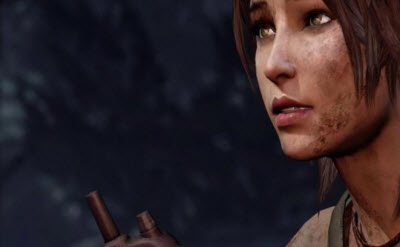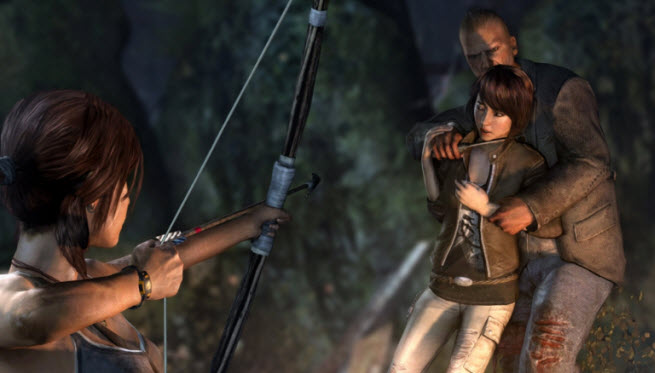The feeling I got when I played a preview of the new Tomb Raider game was one of moving back and forth between a movie and a game. That’s exactly what happens when the scene shifts from a movie-like cinematic and the actual gameplay. The effect is a gripping, more personal story that could go a long way toward reviving Tomb Raider as a top-tier video game franchise.
The game isn’t coming out until 2013, but Square Enix showed it off, giving me a chance to try it out and take on the role of longtime series star, Lara Croft. Square’s showing the game again at this week’s Comic-Con convention in San Diego.
This remake of one of the most iconic video game characters is critical for the future of Square Enix and its developer, Crystal Dynamics. Tomb Raider has sold more than 35 million games over its 16-year history, generating revenues well above $1 billion. But this reboot is an attempt to bring back a lot of gamers like me who got tired of derivative sequels that diminished the brand.
So far, so good.
Movie-like games have been done before, sometimes with too much movie and not enough game. But Tomb Raider is interesting because the switching between the cinematic mode, where you are watching, and the game mode, where you are playing, is very granular. A scene leaps from movie to game and vice versa many times in the course of a minute. This approach is great for storytelling.
 The Lara Croft of this game, who we know from last year’s initial revelation, is a 21-year-old young woman who looks far more innocent and vulnerable than Angelina Jolie (who played Lara Croft in two Tomb Raider movies) ever did as the gun-toting adventurer. The new level picks off shortly after last year’s opening scene. In that scene, after a shipwreck, Lara had to prove her mettle by escaping from an underground mine where she had been imprisoned by a deranged cultist. Now stranded on an island, she seeks other survivors of the shipwreck.
The Lara Croft of this game, who we know from last year’s initial revelation, is a 21-year-old young woman who looks far more innocent and vulnerable than Angelina Jolie (who played Lara Croft in two Tomb Raider movies) ever did as the gun-toting adventurer. The new level picks off shortly after last year’s opening scene. In that scene, after a shipwreck, Lara had to prove her mettle by escaping from an underground mine where she had been imprisoned by a deranged cultist. Now stranded on an island, she seeks other survivors of the shipwreck.
The game focuses closely on Lara’s face, and the glassy fear in her eyes (pictured above) tells you just how traumatic the experience is. Doubt radiates from her face.
Lara begins by looking over a beautifully rendered ocean and runs along a treacherous cliff path. With each leap across a gorge, she must overcome her fears and grow up a little. Lara’s voice broadcasts her fear to the player. “You can do it,” she says. That chatter goes a long way toward conveying emotion better than most games do. When Lara shoots a deer, she becomes sullen as approaches the body, and she apologizes to it. Then a determined look blankets her face, and she skins the carcass with a knife. The game blends these moments between game action — like when you shoot the deer — and cinematics in a seamless way.
This is how you see Lara move from one state of emotion to another. The reward you get in solving puzzles such as fetching a bow and arrow or creating an ax-like tool is a feeling of self-sufficiency and resourcefulness. Lara slowly becomes a survivor and, the more she encounters enemies, a predator. She learns to trust her instincts and escapes hazards in the nick of time.
The visuals look perfect. Lara has realistic body movements, scars, tears in her eyes, and dried blood on her tank top. The forest and cliffs around her look real, with good lighting and shadows. Lara looks at other characters she meets and sizes them up based on their own facial expressions, which can give them away as trusted friend or possible enemy.
The part where Tomb Raider clearly breaks into a game is when Lara finds a base camp. When she finds the first one, a cloud of frosty air puffs out of her mouth, and she sits shivering at the fire, lighting her last match to start a life-sustaining campfire.
At these base camps, you can check out Lara’s inventory, her objectives, achievements, and a map, presented through a slick user interface. This data gives you a lot of information as you clear the level, but I almost wish it wasn’t there, because it definitely pulls you out of the cinematic experience and makes you feel like you’re no longer living inside a story.
You can also die quite easily along the way: You can become food for wolves or target practice for bad guys. When you die, you see a visually violent image, such as a shooter blowing off Lara’s head. This drives you to protect her properly.
In this level, Lara comes upon a group of survivors. She finds one who is clearly a bad guy and tries to alert her female friend without alerting the enemy. Her attempt fails, and the bad guy takes Lara’s friend hostage (pictured at top) and escapes after Lara steps into a bear trap. As a gamer, this scene makes you feel impotent, since you have no way to escape the snare. You have to help Lara out of it, and after she shakes off the wound, she starts walking around again.
Part of the problem between then “when is it a game and when is it a movie” question is when Lara gets hurt. In this single scene, Lara suffers an injury so many times it seems like she breaks every bone in her body, that she really ought to be bleeding to death after a stake drives through her side. But Lara shakes off these wounds as if she were a superwoman, and this shatters the realism of the game.
Some of the action feels good when Lara shoots at wolves with a bow. The wolves stalk her in the bushes and suddenly jump out, forcing the player to shoot the beasts quickly before they chomp down on Lara’s throat. Throughout the level, Lara becomes better, and quicker, at shaking off her fear and taking action that saves her life. It’s these moments that pull Lara out of the movie-like experiences of the game, where her fear (and the developers) give the player no option to act, and put her back into the game, where you can guide her actions as she gains more confidence.
The more that Square Enix stretches out Lara’s coming of age, the better the story. She is more realistic and beautiful when she is making the switch from vulnerable character to a determined survivor. But the tough thing for Crystal Dynamics is that this movie-like storytelling isn’t the most fun for the action-oriented gamer. The dilemma is a tough one. Games such as Uncharted 3: Drake’s Deception and Max Payne 3 have wonderful movie-like stories, but you kill so many people in those titles that the game part of the story goes on and on until it gets boring. With Tomb Raider, the developers have the same problem. If the game is too cinematic, it won’t feel like a game anymore, a problem that plagues Heavy Rain.
The level closes with one of the most gripping scenes in video games.
Lara and the professor run right into a group of pirate-like thugs. The professor is a coward and surrenders his gun, but Lara wants to fight. The thugs take her prisoner, tie her hands, and throw her in with other captured colleagues. One flees, tells Lara to run, but gets shot. The others run, and one knife-wielding thug tells the handcuffed Lara to stay put. She ignores the threat and creeps stealthily past the other bad guys.
Lara almost gets away. She evades most of them, but she must deal with one last enemy. He walks by her in an abandoned hut. Then he returns and points a gun at her head. He closes with her and she breathes uneasily. He tries to feel up her body, and she tries to deflect him. He has rape on his mind. She takes a chance and attacks, but he fends her off and starts suggestively caressing her. She bites his ear and shakes loose.
He grabs her and tries to strangle her. At this point, you control Lara and you have to work the controls quickly, or Lara dies a horrible death with her face blown off. She grabs his gun and shoots him in the balls twice. He dies a slow, gurgling death. Lara cries. With blood spattered on her face, she turns to face the camera and shows her hardened, determined fac. It is a great scene, but I still wonder if this title will properly balance both the game and cinematic elements in a masterful way. If the developers do this just right, it could be a real blockbuster.
VentureBeat's mission is to be a digital town square for technical decision-makers to gain knowledge about transformative enterprise technology and transact. Learn More

